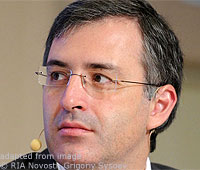Market experts: Guriev situation already priced into ‘Russian risk’

(Interfax – MOSCOW, May 28, 2013) Russian financial market experts differed in their assessments of the impact of the situation surrounding Sergei Guriev, the rector of the New Economic School, which came to light on Tuesday evening.
They agreed that the episode could negatively affect Russia’s investment appeal, but did not think it signaled a shift in the fundamental investment paradigm, since these kinds of events are already priced into Russian stocks.
“I don’t think the situation with Sergei Guriev will be a factor that substantially affects market trends,” Pallada Asset Management deputy head Alexander Baranov told Interfax.
These kinds of events were priced into Russian stocks long ago, he said. Everyone understands what is happening, he said. Investors allocate money to the Russian market out of pragmatic considerations, investing in those assets that are objectively undervalued. Speculative fluctuations on the market are possible. But even in shares of Sberbank of Russia (RTS: SBER), where Guriev is still a member of the supervisory board, there is no reason to expect a medium-term effect, Baranov said.
The head of the dealing center at Metallinvestbank, Sergei Romanchuk, said information concerning Guriev’s troubles had already affected the market and could continue to do so. “The effect from the news has taken the form of a decline on the Russian market, amounting to about 1 percentage point, although the decline in futures was appreciable late yesterday evening,” Romanchuk told Interfax.
“I expect that the market is actually thick-skinned and there will be no noticeable decline in the near future. The market development paradigm is well-known and is not changing. But the long-term effect will be unambiguously negative, will lead to a decline in Russia’s investment appeal. Sergei Guriev is one of the brightest economists among those that worked constructively with the authorities on various promising projects, commanding authority among a wide circle. The emergence of these problems shows that it is impossible to be an independent expert. That will make other experts more cautious, self-censoring. Naturally this will worsen the investment climate overall,” Romanchuk said.
Guriev’s resignation as rector of the New Economic School would be no cause for celebration on the market, Zurich Capital Management’s deputy general director for investment analysis Andrei Vernikov said. “Sergei Guriev supported Alexei Navalny, many experts connect his resignation to the Yukos case. Traders are very sensitive to any news that might heighten political tensions and have a negative effect on Western investors. There is currently no domestic resource capable of driving Russian stocks higher,” Vernikov said.
But the decline in the Russian stock indexes on Wednesday, which amounted to 2.3%-2.5% as of 2:45 p.m. Moscow time, likely had more to do with a global retreat than with the news about Guriev.
European markets were down about 0.9%-1.2% at that time on Wednesday, including a loss of about 1.2% in the FTSE 100. Oil prices were down about 0.5.
Against that backdrop, there is little surprising about a 2%-2.5% decline in Russian equities and a 0.5%-0.6% decline in the ruble (the dollar and the euro had gained about 15-20 kopecks compared with the close on Tuesday), the Interfax Center for Economic Analysis said.
Global markets were reacting to the news that the IMF had downgraded its forecast for China’s GDP, to 7.75% from 8% previously.
Guriev on Tuesday withdrew his name from consideration as a candidate for re-election to the Sberbank supervisory board. The new board will be elected at the AGM on May 31.
Later it was learned that Guriev had been questioned by the Investigative Committee some time before concerning the Yukos case. The media reported that he might resign a host of positions he holds and, perhaps, not return to Russia from France. “He has come under pressure from the authorities ever since he publicly expressed support for Alexei Navalny,” the business daily Vedomosti reported.
Asked for comment, an Investigative Committee spokesman told Interfax: “Guriev was indeed called in for questioning concerning the so-called Yukos case.” Meanwhile, a source in law enforcement told Interfax that Guriev was not a subject in a criminal case.
